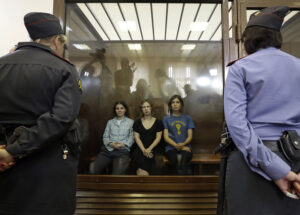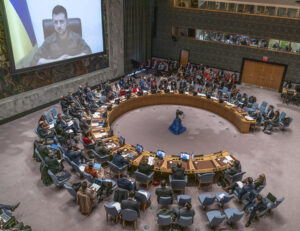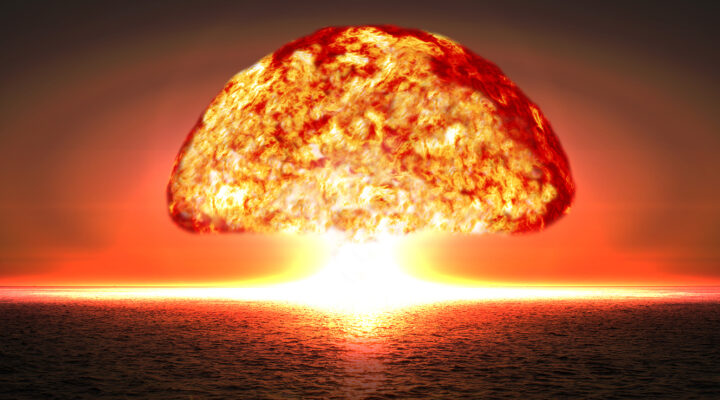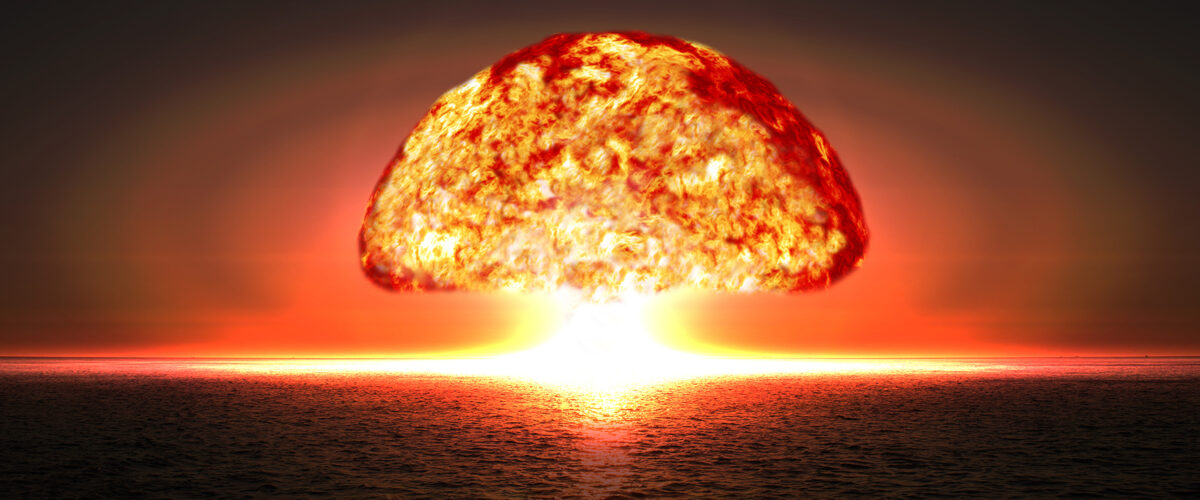The mirage Putin likely refers to is the afterlife, since happiness in this life is ruled out. Putin considers himself a Christian and perhaps imagines that his Christian identity qualifies him to prosper in heaven after he dies. While he remains tight-lipped on his exact views, a fuller view of his understanding of Christianity may be pieced together based on a few revealing statements, like the one above. Unsurprisingly, it represents some of the most destructive theology plaguing the faith today.
 In another statement from 2018, Putin declares he is ready to use nuclear weapons, but he will not be the first to strike. Instead, he will wait until another nation is provoked enough to bomb his people, at which point he will immediately retaliate. His refusal to strike first is not because the use of nuclear weapons is morally repugnant to him. On the contrary, he believes by striking second (and, by the way, scapegoating his own people), Russians become “the victims of the aggression.” He goes on: “We will go to heaven as martyrs, and they will just drop dead. They will not even have time to repent for this.”
In another statement from 2018, Putin declares he is ready to use nuclear weapons, but he will not be the first to strike. Instead, he will wait until another nation is provoked enough to bomb his people, at which point he will immediately retaliate. His refusal to strike first is not because the use of nuclear weapons is morally repugnant to him. On the contrary, he believes by striking second (and, by the way, scapegoating his own people), Russians become “the victims of the aggression.” He goes on: “We will go to heaven as martyrs, and they will just drop dead. They will not even have time to repent for this.”
Two cancerous beliefs seem to infect Putin’s theology. First, he locates Christian hope in an afterlife that has little moral bearing on this life. This opens the door to a Russian version of Christian nationalism that is given a free pass. Second, he holds to the idea that you can commit a lifetime of evil, but if you repent on your deathbed, you will earn eternal life in heaven. And if you are a victim with the right faith, God is obligated to treat you as a martyr.
“He locates Christian hope in an afterlife that has little moral bearing on this life.”
Putin has the support of the patriarch of the Russian Orthodox Church for his nationalistic aims. Patriarch Kirill not only has publicly endorsed Putin throughout his rule but consistently invokes Christian imagery to do so. He has claimed that Putin is a “miracle of God” who was sent to save Russia.
In fact, Russian church and state have become so entangled, that when the prophetic punk group Pussy Riot famously performed an anti-Putin demonstration inside Christ the Savior Cathedral in 2012, they were arrested for “hooliganism” and were tried and thrown in prison on the grounds of “religious hatred.” But Pussy Riot said no ill word about God, Jesus or the Virgin Mary — they only invoked their names in a protest prayer against Vladimir Putin. It is curious how when Pussy Riot spewed Putin-hatred, the church heard God-hatred.
Look at some of the lyrics:
Virgin birth-giver of God, drive away Putin!
Virgin birth-giver of God, become a feminist!
The Virgin’s belt won’t replace political gatherings
the eternal Virgin Mary is with us in our protests!
Patriarch Gundyay believes in Putin
Would be better if he believed in God!

On Aug. 17, 2012, feminist punk group Pussy Riot members, from left, Yekaterina Samutsevich, Maria Alekhina and Nadezhda Tolokonnikova sit in a glass cage at a court room in Moscow, Russia. Jailed Pussy Riot member Nadezhda Tolokonnikova said in an interview released by Germany’s Der Spiegel magazine on Sunday, Sept. 2, 2012, that she regrets nothing about the band’s anti-government performance in a cathedral that got them convicted of hooliganism and sentenced to two years behind bars. (AP Photo/Sergey Ponomarev, File)
Was Pussy Riot wrong to call out the Russian Orthodox Church for its misrepresentation of the Christian faith? Overall, the lyrics sound less like religious hatred and more like liberation theology — an exhortation for God to stand with them against systemic injustice and to take God’s rightful place in solidarity with the oppressed.
After the group was escorted out in handcuffs, the church organized an emergency prayer day, as if it had been the victim of a tragedy. The real tragedy is not that Pussy Riot criticized the church, but that the church is not Pussy Riot. If they were, would there be a war in Ukraine?
In a sermon on March 6, 2022, Patriarch Kirill suggested the war against Ukraine is justified due to a violation of “God’s law.” The violation he refers to is Ukraine’s support of gay rights and gay pride parades, which he insists are “condemned by the word of God — both the Old and the New Testament.”
Kirill seems to think the term “word of God” refers to the literal words on the pages of the Bible, whereas Christian scholars understand “word” to be interchangeable with the “wisdom” or “logic” of God that did not just begin when the Bible was written. Yes, Kirill can point to texts from Leviticus or Romans that seem to condemn homosexuality, but defenders of LGBTQ persons can explain those texts and offer counter-texts to support their own stance.
Hence the problem with pitting biblical texts against each other to defend one’s preset convictions. The battle-of-the-verses is a futile game that almost always ends in a draw. The more appropriate question is: Whose stance is better supported by the overarching biblical story? For the text can conform to you, but the story can change your life.
“The text can conform to you, but the story can change your life.”
In his book We Have Been Believers, Baptist theologian James H. Evans Jr. promotes the way African American Christians employ Scripture, which he beautifully articulates as: a refusal “to dismember the biblical text without first remembering the biblical story.” The Bible is one big story, filled with smaller episodes. The arc of the story is about justice and deliverance from oppression amidst the drama of the human experience. Oftentimes, the smaller episodes are ugly, appalling and difficult to defend. When dismembered from the context of the whole story, these episodes say more about human nature than God’s nature.
God’s nature is the heart that pulses throughout the entire narrative from Genesis to Revelation. It is the theme of the Bible, which is best summarized in what scholars call Deuteronomist theology. This is the assumed theology of the entire New Testament, but it is most clearly explained in the Book of Deuteronomy. The Deuteronomist speaks directly to the reader with pronouns like “you,” and the frequent repetition of the command shamar, which means “hear this/remember this.” The Deuteronomist understands the human tendency to get distracted by the smaller episodes and lose sight of the grander story. So, it is spelled out for us: If you remember one thing and one thing only, let it be this — Choose life.
Deuteronomist theology says that at every moment we have the option to choose life or death. And we are implored: “Choose life, so that you … may live” (Deuteronomy 30:19b). Not that we may live, as in have a heartbeat, and not even that we may experience life after death; but that we may experience what it means to truly live, free from the things that bind us.
Paul quotes Jesus (who quotes Deuteronomy) when he reminds his readers to love our neighbors as ourselves. And just in case people try to define love in corrupt terms, Paul clarifies further: “Love does no wrong to a neighbor; therefore, love is the fulfilling of the law” (Romans 13:10). That, Paul says, is God’s only law. It is the meaning of what it is to choose life. The only sin is forgetting to return to this law.
The word “repent” means to return. The Deuteronomist’s plea is to return, time and again, to this one law. Therefore, to choose life requires a constant reminder to repent. When Putin celebrates the idea that his enemies would have no time to repent for their actions, it is clear that he misunderstands the purpose of repentance. Christians should hope for repentance from everyone, as it represents a commitment to restoring the world.
“People frequently choose remorse over repentance, as we would prefer to remain in the comfortable confines of guilt than do the painful work of change.”
Perhaps Putin confuses repentance with remorse. Remorse is an admission of guilt and a sincere-seeming apology, often used to save face. Repentance, conversely, is an about-face. People frequently choose remorse over repentance, as we would prefer to remain in the comfortable confines of guilt than do the painful work of change. But remorse without repentance does nothing to repair the harm done to oneself and the world. For this reason, the concept of death-bed repentance is futile. While there is value in a genuine change of heart, there is little time left for a change of action. The damage has been done, and the dying will not be around to pick up the pieces.

United Nations Security Council meeting on Ukraine to discuss war crimes at UN Headquarters in New York on April 5, 2022. . The Security Council was addressed by Ukrainian President Volodymyr Zelensky (seen on the scfreen), who spoke about civilian lives lost and atrocities discovered in the Ukrainian city of Bucha after the Russian military retreat. (Photo by Lev Radin/Sipa USA)(Sipa via AP Images)
In a scathing address to the United Nations on April 10 this year, Ukrainian President Volodymyr Zelenskyy said of Putin: “When people lack the courage to admit their mistakes, apologize, adapt to reality and learn, they turn into monsters. And when the world ignores it, the monsters decide that it is the world that has to adapt to them.”
Zelenskyy perfectly summarizes what it looks like, in Deuteronomist terms, to choose death and perish. When people forget to repent, they lose the ability to see a need for it. They replace God as the center of their life with some ideology, like Christian nationalism; and when the world ignores — or worse, affirms — this, the repercussions can be nuclear.
The effects nuclear bombs will have on the natural world are devastating. They will not only obliterate a portion of the human species in the short-term but will make the world an unlivable place for our children and grandchildren. For Putin to threaten nuclear bombs so flippantly proves that he sees little value in human life or in any of the created world that God deems “good.”
This world is not a bad place to be escaped from — it is a complex world, both beautiful and broken, and we are tasked with the job of mending the brokenness.
“Putin and Kirill would do well to attend to the Lord’s Prayer, in which Jesus teaches us to manifest a world on earth as it is in heaven.”
Putin and Kirill would do well to attend to the Lord’s Prayer, in which Jesus teaches us to manifest a world on earth as it is in heaven. We do not need to escape this world to find heaven. If heaven represents perfect justice, then justice-makers like Pussy Riot know something about heaven now. If heaven represents the community born through service to neighbor and sacrifice of self, then Zelenskyy knows something about heaven now. When churches and communities around the world come together to voice solidarity with Ukraine, they are calling for heaven to come to earth here and now.
Heaven may be for Putin an unreachable mirage on the horizon, since he has turned so far against its culture (a culture of love, justice and compassion) in favor of power at all costs. This bears a spiritual cost to him as well. When someone sins against the world, the effects of that sin come back like a boomerang to punish the sinner. As SMU Perkins professor Dallas Gingles says, “Sin is an intentional privation of self.” In other words, it is choosing death. In the extreme sense, sin diminishes our existence until there is nothing to live into.
It is one thing to point out the faults of Vladimir Putin and Patriarch Kirill, but it is also important to trouble “the sleep of the captive theologies that support them,” as James McClendon has said. The theology that undergirds Putin’s action is tragically popular, as the chronic misunderstanding of our own doctrinal terms allows these destructive theologies to run amuck. The world is in turmoil, and one terrible interpretation of the Christian faith has been used to get us here.
Christians need to rally behind the transformative story of the Bible, find our inner hooliganism, and reclaim God’s passion for justice. Never in our lifetime have the stakes been so high. We must heed the Deuteronomist plea: Choose life, so that you and your children may live.
Jillian Mason Shannon is a second-year master of divinity student at Perkins School of Theology. She lives in San Antonio, Texas, with her husband, Chris, and 4-year-old son, River, and is a member of Woodland Baptist Church in San Antonio.
Related articles:
Putin is no Antichrist; he’s worse than that | Analysis by Rodney Kennedy
How Putin’s picture in a fictitious dictionary challenges all of us | Opinion by Robert Sellers


